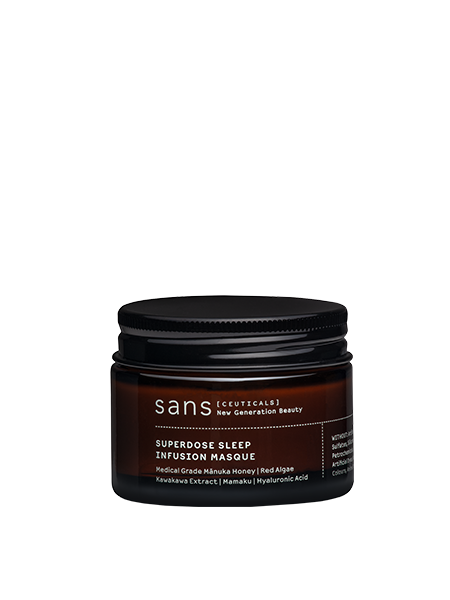While many night creams focus on repair, our Sleep Infusion Masque takes it a step further — proactively fortifying your skin against tomorrow’s challenges...
Independent in-vitro testing of Superdose Sleep Infusion Masque, showcases remarkable efficacy in skin protection and rejuvenation*:
+ Up to 38% protection against skin inflammation that can lead to redness, irritation and premature ageing.*
“Our Sans community have long sung the praises of Sleep Infusion Masque; so we're thrilled to have this sentiment now backed by impressive in-vitro results. Just like you’d apply sunscreen during the day, applying our masque at night is a no-fuss solution to help protect against future damage — working overtime while you sleep.”
What impact can inflammation have on overall skin health?
The word ‘inflammation’ covers a range of skin conditions we usually think of as separate. Sunburn and day-to-day UV damage, acne, skin infections, allergic rashes, eczema and psoriasis are all inflammatory conditions that come and go but over time can add up to skin being in a near-constant state of low-grade inflammation.
Ongoing low-grade inflammation is also a key factor in skin surface decline and loss of structural resilience.
What’s in our Superdose Sleep Infusion Masque that makes it so fortifying against inflammation?
The secret is a synergistic complex of five anti-inflammatory and healing actives: medical-grade mānuka honey, down-regulating red algae, reparative vitamin B5, soothing kawakawa extract and anti-oxidant mamaku. Hyaluronic acid amps up the skin’s hydration, helping reduce inflammation.
Working together, they nourish and decrease your skin’s susceptibility to inflammation, allowing redness to reduce and your skin to look smoother.
What exactly is in-vitro testing?
Translated from Latin, the term in-vitro means "in glass" — in-vitro testing is carried out in a lab; as opposed to clinical trials which take place on a living human subject. Although both forms of testing are valuable, the scientific nature of in-vitro testing in a lab environment removes human bias and provides objective results on efficacy.


